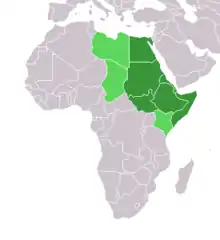Northeast Africa
Northeast Africa, or Northeastern Africa or Northern East Africa as it was known in the past, is a geographic regional term used to refer to the countries of Africa situated in and around the Red Sea. The region is intermediate between North Africa and East Africa, and mainly encompasses the Horn of Africa (Ethiopia, Eritrea, Somalia-Somaliland, Djibouti), The Sudans (Sudan, South Sudan), and Egypt, although sometimes its borders are stretched to either include Kenya, or Chad and Libya. The region has a very long history of habitation with fossil finds from the early hominids to modern human and is one of the most genetically and linguistically diverse regions of the world, being the home to many civilisations and located on an important trade route that connects multiple continents.[1][2][3][4][5]

References
- Mitchell, Peter; Lane, Paul (2013-07-04). The Oxford Handbook of African Archaeology. OUP Oxford. ISBN 978-0-19-162615-9.
- Klees, Frank; Kuper, Rudolph (1992-01-01). New light on the Northeast African past : current prehistoric research: Contributions to a symposium, Cologne 1990. Heinrich-Barth-Institut.
- Hepburn, H. Randall; Radloff, Sarah E. (2013-03-14). Honeybees of Africa. Springer Science & Business Media. ISBN 978-3-662-03604-4.
- Daniel, Kendie (1988). NORTHEAST AFRICA AND THE WORLD ECONOMIC ORDER. Michigan, US. pp. 69–82.
- Project MUSE. (2020). Northeast African Studies. Retrieved March 22, 2020. "This distinguished journal is devoted to the scholarly analysis of Ethiopia, Eritrea, Djibouti, Somalia, and Sudan, as well as the Nile Valley, the Red Sea, and the lands adjacent to both."